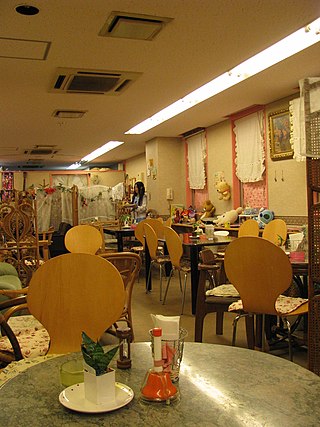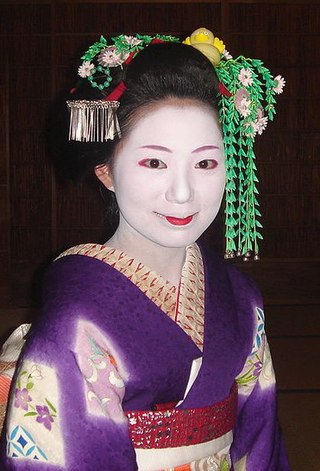
Cultural anthropology is a branch of anthropology focused on the study of cultural variation among humans. It is in contrast to social anthropology, which perceives cultural variation as a subset of a posited anthropological constant. The term sociocultural anthropology includes both cultural and social anthropology traditions.

Sexuality and gender identity-based cultures are subcultures and communities composed of people who have shared experiences, backgrounds, or interests due to common sexual or gender identities. Among the first to argue that members of sexual minorities can also constitute cultural minorities were Adolf Brand, Magnus Hirschfeld, and Leontine Sagan in Germany. These pioneers were later followed by the Mattachine Society and the Daughters of Bilitis in the United States.

In Japan, a salaryman is a salaried worker. In Japanese popular culture, this is embodied by a white-collar worker who shows overriding loyalty and commitment to the corporation where he works.
Fat fetishism or adipophilia is a sexual attraction directed towards overweight or obese people due primarily to their weight and size.
Anne Allison is a professor of cultural anthropology at Duke University in the United States, specializing in contemporary Japanese society. She wrote the book Nightwork on hostess clubs and Japanese corporate culture after having worked at a hostess club in Tokyo.
A hostess club is a type of night club found primarily in Japan. They employ primarily female staff and cater to men seeking drinks and attentive conversation. The modern host club is a similar type of establishment where primarily male staff attend to women. Host and hostess clubs are considered part of mizu shōbai, the night-time entertainment business in Japan.
Nightwork is shift work which is carried out at night.

Cynthia Holden Enloe is an American political theorist, feminist writer, and professor. She is best known for her work on gender and militarism and for her contributions to the field of feminist international relations. She has also influenced the field of feminist political geography, with feminist geopolitics in particular.
No-pan kissa is a Japanese term for maid cafés where the waitresses wear short skirts with no underwear. The floors, or sections of the floor, were sometimes mirrored.
Timeline of anthropology, 1990–1999

Maid cafés are a subcategory of cosplay restaurants found predominantly in Taiwan and Japan. In these cafés, waitresses, dressed in maid costumes, act as servants, and treat customers as masters as if they were in a private home, rather than as café patrons. The first permanent maid café, Cure Maid Café, was established in Akihabara, Tokyo, Japan, in March 2001, but maid cafés are becoming increasingly popular. The increased competition drove the cafes to employ more diversified themes, gimmicks and even unusual tactics to attract customers. They have also expanded overseas to several countries around the world. It has been said that only women are allowed to kiss the maids.
Sexual capital or erotic capital is the social power an individual or group accrues as a result of their sexual attractiveness and social charm. It enables social mobility independent of class origin because sexual capital is convertible, and may be useful in acquiring other forms of capital, including social capital and economic capital.
Clinical ethnography is a term first used by Gilbert Herdt and Robert Stoller in a series of papers in the 1980s. As Herdt defines it, clinical ethnography
is the intensive study of subjectivity in cultural context...clinical ethnography is focused on the microscopic understanding of sexual subjectivity and individual differences within cross-cultural communities. What distinguishes clinical ethnography from anthropological ethnography in general is (a) the application of disciplined clinical training to ethnographic problems and (b) developmental concern with desires and meanings as they are distributed culturally within groups and across the course of life.
Nada Inada was the pen-name of a Japanese psychiatrist, writer and literary critic active in late Shōwa period and early Heisei period Japan. His pen name is from the Spanish language phrase "nada y nada".

Sexuality in Japan developed separately from that of mainland Asia, as Japan did not adopt the Confucian view of marriage, in which chastity is highly valued. Monogamy in marriage is often thought to be less important in Japan, and sometimes married men may seek pleasure from courtesans. Prostitution in Japan has a long history, and became especially popular during the Japanese economic miracle, as evening entertainments were tax-deductible. Decreased sex drive in the 21st century has been blamed for the low Japanese birth rate and declining growth of the Japanese population.
Ganbaru, also romanized as gambaru, is a ubiquitous Japanese word which roughly means to slog on tenaciously through tough times.

Dude, You're a Fag: Masculinity and Sexuality in High School is a 2007 book by the sociologist C. J. Pascoe. Through ethnographic research, Pascoe examines masculinity in high schools. Pascoe's work proposes that masculinity is defined primarily through dominance and control. Further, masculinity is established by high school boys through their use of the fag (faggot) epithet. This book explores masculinity as enacted by male- and female-bodied students, the consequences of a strict gender system, heteronormativity within the school system, racialized masculine ideals, and acts of resistance to the gendered social order. Pascoe conducted fieldwork for a year and a half at "River High School", conducted formal interviews with fifty students, and informal interviews with many other students, administrators and faculty members.
Sayo Hayakawa is a Japanese fashion model. She is best known for her stint as a main model for the Koakuma Ageha cabaret-gyaru fashion magazine.
Prostitution, as defined under modern Japanese law, is the illegal practice of sexual intercourse with an 'unspecified' (unacquainted) person in exchange for monetary compensation, which was criminalised in 1956 by the introduction of article 3 of the Anti-Prostitution Law. However, the definition of prostitution made illegal under this law is strictly limited to sexual intercourse with an 'unspecified person', and does not criminalise the sale of numerous other acts performed by sex workers in exchange for compensation, such as oral sex, anal sex, mammary intercourse, and other non-coital sex acts; the Businesses Affecting Public Morals Regulation Law of 1948, also known as the "Law to Regulate Adult Entertainment Businesses", amended in 1985, 1999 and 2005, regulates these businesses, making only one definition of prostitution in Japan illegal.
Arlene Stein is an American sociologist and author best known for her writing about sex and gender, the politics of identities, and collective memory. She is Distinguished professor of sociology at Rutgers University where she directs the Rutgers University Institute for Research on Women. Stein has also taught at the University of Essex and at the University of Oregon.






